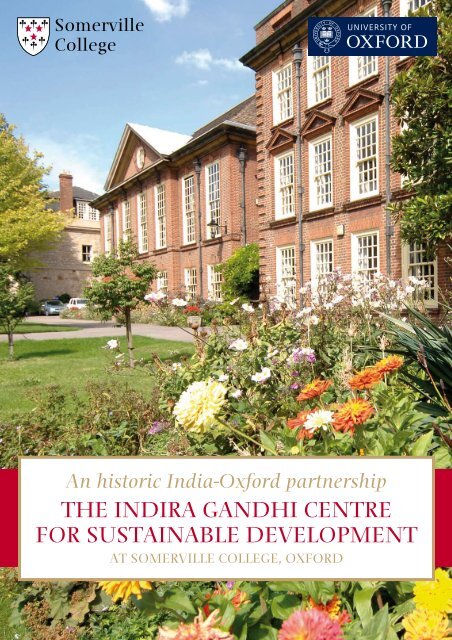The InDIRA GAnDhI CenTRe fOR SUSTAInAble DevelOpmenT India
The InDIRA GAnDhI CenTRe fOR SUSTAInAble DevelOpmenT India
The InDIRA GAnDhI CenTRe fOR SUSTAInAble DevelOpmenT India
You also want an ePaper? Increase the reach of your titles
YUMPU automatically turns print PDFs into web optimized ePapers that Google loves.
Somerville<br />
College<br />
An historic <strong>India</strong>-Oxford partnership<br />
<strong>The</strong> Indira Gandhi Centre<br />
for Sustainable Development<br />
At Somerville College, Oxford
<strong>The</strong> Indira Gandhi Centre for Sustainable Development<br />
will help shape the next century of <strong>India</strong>’s growth<br />
by educating, connecting and supporting its future<br />
leaders in sustainable development and forging lasting<br />
partnerships between <strong>India</strong>n institutions of learning and<br />
the University of Oxford.<br />
<strong>The</strong> way <strong>India</strong> develops during the 21st Century will not only have an impact on its 1.25 billion people,<br />
but will also have world-wide significance. Finding a new sustainable model of economic growth for<br />
<strong>India</strong>’s development will play a critical part in averting a global crisis.<br />
Somerville College, a constituent college of the collegiate University of Oxford, is Indira Gandhi’s alma mater. <strong>The</strong> Indira Gandhi<br />
Centre will honour her legacy to the world by addressing key issues of sustainable development. <strong>The</strong>re will be three core activities:<br />
advancing research, developing talent and facilitating collaboration, centred on a landmark facility in the University of Oxford’s new<br />
Radcliffe Observatory Quarter.<br />
For more than six centuries, the University of Oxford has treasured its links with <strong>India</strong>. Building on these strong historic foundations,<br />
Oxford is committed to deepen and extend strategic collaborations in <strong>India</strong>, particularly in areas such as food security, environmental<br />
sustainability, international governance and global culture. Building on the University’s pioneering research into these areas of<br />
pressing concern, the Indira Gandhi Centre will celebrate one of the most prominent world leaders of the 20th Century by increasing<br />
support for <strong>India</strong>n students and advancing interdisciplinary research in sustainable development.<br />
<strong>The</strong> Chancellor of the University of Oxford, Lord Patten of Barnes, the Vice-Chancellor, Professor Andrew Hamilton, and the Principal<br />
of Somerville College, Dr Alice Prochaska, are delighted and honoured that this vital project has received generous support from<br />
the Government of <strong>India</strong>. <strong>The</strong> University has a strong history of providing scholarship opportunities for students from <strong>India</strong>, and it<br />
is a strategic priority for Oxford to increase the number of such scholarships in coming years. <strong>The</strong> support from the Government of<br />
<strong>India</strong> towards endowing scholarships for graduate students at the Indira Gandhi Centre represents a milestone in advancing these<br />
opportunities.<br />
Somerville College plans to establish the Indira Gandhi Centre programme, working closely with the rest of the University, in the<br />
period 2012-2017, in time for the centenary celebrations of Mrs Gandhi’s birth on 19 November 1917. Over the next few decades,<br />
the Centre will become one of the most dynamic, interdisciplinary sites at the University of Oxford. It will have a transformational<br />
impact on the lives of future leaders, who will help to direct a new paradigm of sustainable development in <strong>India</strong> and beyond.<br />
Mrs Gandhi greeting Somerville scholar Sobhita Jain during her visit to Oxford in 1971
Research opportunities where<br />
they are most needed<br />
<strong>The</strong> world faces an increasing number of threats to natural resources, health and global security.<br />
Climate change, water supplies and the provision of enough food for a rapidly increasing global<br />
population are all major international concerns.<br />
<strong>India</strong> will play a critical role in averting a global crisis. <strong>India</strong>’s 1.25 billion people already account for nearly 20% of the world’s<br />
population; and with a rapidly growing middle class, the country’s demand for resources will become ever greater over the next<br />
20 years.<br />
<strong>India</strong> still has approximately 500 million people without reliable access to electricity, around 250 million lacking access to safe<br />
drinking water and millions of rural poor exposed to rising food prices and changing climate conditions. While it is increasing, <strong>India</strong>’s<br />
investment in research and development is still relatively small. <strong>The</strong> Indira Gandhi Centre creates an opportunity to direct greater<br />
research towards more inclusive sustainable growth.<br />
Investing in <strong>India</strong>’s intellectual capital<br />
While <strong>India</strong> has one of the largest higher education systems in the world hosting 16 million students,<br />
in 2007-2008 <strong>India</strong> produced only 13,000 PhDs – fewer than the UK’s much smaller student population.<br />
Competition for places at <strong>India</strong>’s premium institutions is incredibly intense, averaging an acceptance<br />
rate of around 2%, compared with 23% for applicants to Oxford.<br />
<strong>The</strong> Indira Gandhi Centre for Sustainable Development will enhance the opportunities available to the brightest and most talented<br />
students from <strong>India</strong> in the field of sustainable development, enabling them to find practical solutions to some of the main challenges<br />
facing their country. It will invest in intellectual capital and build a platform for strengthening partnerships with <strong>India</strong>n scholars and<br />
institutions. This in turn will help to implement change and create a community of alumni to develop lifelong learning opportunities<br />
in <strong>India</strong>.<br />
Sources: NESTA (Our Frugal Future: Lessons from <strong>India</strong>’s Innovation System), Stern Review, McKinsey Global Institute, WWF & CII (<strong>India</strong>)<br />
Aditi Lahiri, Professor of Linguistics, with <strong>India</strong>n students, gathered before Indira Gandhi’s portrait at Somerville College
Facilitating cross-disciplinary<br />
solutions to global challenges<br />
<strong>The</strong> Indira Gandhi Centre for Sustainable Development will focus on a series of ‘Impact <strong>The</strong>mes’, each<br />
one pivotal for <strong>India</strong>’s future growth. <strong>The</strong> first of these will be food security, drawing on Oxford’s and<br />
Somerville College’s expertise and the significance of this topic for <strong>India</strong>’s future development.<br />
Further themes will be launched as the Indira Gandhi Centre develops; these will build upon expertise across all four of the<br />
University of Oxford’s academic divisions and focus on environmental sustainability, sustainable energy, international governance<br />
and global culture.<br />
<strong>The</strong> Indira Gandhi Centre<br />
programme will:<br />
• Support talent and leadership development:<br />
the establishment of scholarships available<br />
specifically to <strong>India</strong>n students at Oxford, with a<br />
cohort of <strong>India</strong>n graduate students participating<br />
directly in research of relevance to <strong>India</strong>.<br />
• Advance sustainability research: the Centre<br />
will strengthen interdisciplinary and pioneering<br />
research into food security, environmental<br />
sustainability and international governance<br />
by establishing post-doctoral positions and<br />
fellowships.<br />
• Build an inspirational research facility on<br />
Oxford’s new campus: <strong>The</strong> Indira Gandhi Centre<br />
building will be designed to house an innovative<br />
“incubator” environment, fostering new<br />
thinking and robust solutions to the challenges<br />
facing <strong>India</strong> and South Asian communities<br />
today. <strong>The</strong> building will be prominently located<br />
opposite Oxford’s new Blavatnik School of<br />
Government.<br />
Within each Impact <strong>The</strong>me, the Indira Gandhi<br />
Centre will develop its activities around three core<br />
activities: research, talent, and collaboration.<br />
Research Talent Collaboration<br />
2 x Research<br />
Fellowships for<br />
each Impact <strong>The</strong>me<br />
to progress pivotal<br />
work in the field.<br />
5 x PhD Student Scholarships per year. Research<br />
work will be complemented by wider leadership<br />
development, including social entrepreneurship<br />
and industry internships. Scholars will be<br />
required to return to <strong>India</strong> to put their expertise<br />
into practice.<br />
<strong>The</strong> Indira Gandhi Centre will forge lasting<br />
partnerships with key <strong>India</strong>n institutions and<br />
become a focal point in Oxford for discussions<br />
relating to <strong>India</strong>. A series of events, including a<br />
range of conferences and seminars, will facilitate<br />
collaboration and disseminate knowledge.
A new landmark facility for <strong>India</strong><br />
at Oxford<br />
<strong>The</strong> Indira Gandhi Centre for Sustainable Development will sit at the heart of the University<br />
of Oxford in a purpose built, inspirational, landmark building in the new Radcliffe<br />
Observatory Quarter.<br />
<strong>The</strong> Radcliffe Observatory Quarter, a 10-acre site in central Oxford, is one of the most significant development projects the<br />
University of Oxford has undertaken for more than a century. <strong>The</strong> Blavatnik School of Government, a major international initiative,<br />
is to be built on the western end of the Radcliffe Observatory Quarter, immediately opposite the Indira Gandhi Centre.<br />
<strong>The</strong> Indira Gandhi Centre building will be designed to house an innovative “incubator” environment, fostering new thinking and<br />
robust solutions to the challenges facing <strong>India</strong> and South Asian communities today. <strong>The</strong> Indira Gandhi Centre will become one<br />
of the most dynamic, vibrant and interdisciplinary sites in the University of Oxford, attracting a range of students, academics,<br />
practitioners and policy makers to Somerville College and the University, all passionately connected by a common interest in <strong>India</strong>.<br />
<strong>The</strong> Centre will develop a focus at the University on studies of <strong>India</strong>n culture and of global issues where <strong>India</strong> is a key player.<br />
Initial design concept for the exhibition area in the Indira Gandhi Centre<br />
Radcliffe Observatory Quarter Masterplan with the new Somerville buildings
Somerville’s enduring links to <strong>India</strong><br />
Somerville College’s links with <strong>India</strong> date back to 1889, with the arrival of Cornelia Sorabji, who was not<br />
merely Somerville’s first <strong>India</strong>n student, but the first <strong>India</strong>n woman to study at any British University;<br />
Somerville’s founding Principal, Madeleine Shaw Lefevre, was among those active in raising funds to<br />
enable her to come to England.<br />
Since then, Somerville has welcomed many<br />
generations of <strong>India</strong>n students, most notably Indira<br />
Gandhi, who entered Somerville in October 1937<br />
to read Modern History. Indira Gandhi’s time at<br />
Somerville is recorded in the College archives, in<br />
her own published letters to her father, and in the<br />
affectionate memories of her College contemporaries,<br />
who grieved when she was obliged by illness to leave<br />
at the end of her first year. Several of them, together<br />
with her former tutors, Dame Lucy Sutherland, and<br />
Professor May McKisack, were present in Somerville<br />
to greet her when, as Prime Minister of <strong>India</strong> and an<br />
Honorary Fellow of the College, she came to Oxford in<br />
1971 to receive an honorary Doctorate of Civil Law.<br />
With some exceptions – like Soonu Kochar, who<br />
entered the <strong>India</strong>n Diplomatic Service and represented<br />
her country as Ambassador to Holland, Argentina and<br />
France – students coming to Somerville from <strong>India</strong><br />
in more recent times have tended to be destined for<br />
academic careers, their choices of specialisation<br />
often reflecting the continuity of values and concerns<br />
with which the College has always been associated.<br />
Shobhita Jain and Utsa Patnaik for example, both<br />
postgraduate students at Somerville in the late 1960s,<br />
became respectively Professor of Women’s Studies<br />
and Development and Economic Studies at the Indira<br />
Gandhi National Open University, Maidan Garhi, and<br />
Professor of Economics at the Centre for Economic<br />
Studies and Planning at Jawaharlal Nehru University<br />
in New Delhi.<br />
Cornelia Sorabji, the first <strong>India</strong>n student at Somerville College, and the first <strong>India</strong>n<br />
woman admitted to a British university<br />
Contact details<br />
For further information, please contact:<br />
Dr Alice Prochaska<br />
Principal<br />
Somerville College<br />
Oxford OX2 6HD<br />
T: +44 (0)1865 270630<br />
F: +44 (0)1865 280623<br />
E: alice.prochaska@some.ox.ac.uk<br />
www.some.ox.ac.uk<br />
Priya Oberoi<br />
Senior Adviser and<br />
Alumna of Somerville College<br />
E: priya@oberoicapitalpartners.com

















